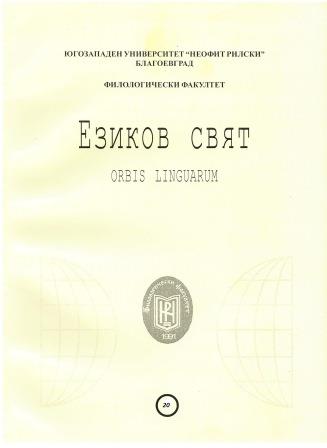ZMIANY ILOŚCIOWE W LEKSYCE WSPÓŁCZESNEGO JĘZYKA POLSKIEGO (FUNKCJE ELEMENTÓW ZAPOŻYCZONYCH)
QUANTITATIVE CHANGES IN THE VOCABULARY OF CONTEMPORARY POLISH (FUNCTIONS OF BORROWED WORDS AND SUFFIXES)
Author(s): Katarzyna Dróżdż-ŁuszczykSubject(s): Language and Literature Studies, Theoretical Linguistics, Morphology, Lexis
Published by: ЮГОЗАПАДЕН УНИВЕРСИТЕТ »НЕОФИТ РИЛСКИ«
Keywords: Polish lexical system; loanwords; foreign word-formation units; internationalization; language games; communication on the internet
Summary/Abstract: The article attempts to provide an answer to the questions concerning the aspects of internationalization of the Polish lexical stock, in the 21th century. In the first part, the author presents a list of new loanwords, for example, pendrive, followers, vlog, burger, webinarium, ciabatta, tacos. The new words are mostly borrowed from the English language. In the second part of the article, the author presents neologisms formation which perform various function (for example expressive, nominative). In this section the productivity of foreign prefixes and ranks with the formation of borrowed morphemes are discussed, too. The main objective of the paper is to show how old loanwords (for example alkoholik, parking, skleroza, automat, akwarium) have an impact on the creation of hybrids. The author describes word-formation like motylarium, żółwiarium, pająkarium, reklamoza, szyldoza, grantoza, serialoholik, fejsoholik, kawomat, ciastkomat, parawaning, grobing and she points to the patterns by which new units were created. Other authors perceive these phenomena as inextricably bound with the tendency to internationalization and with the processes of “linguistic globalization”. The main thesis of the article is that borrowed suffixes have different functions, the most important of which are creativity and language game, evaluation, especially negative one. The analysed phenomena prove that there is no clear border between creation of words and their borrowing, between the nominative function and the language game.
Journal: Езиков свят - Orbis Linguarum
- Issue Year: 20/2022
- Issue No: 1
- Page Range: 023-028
- Page Count: 6
- Language: Polish

